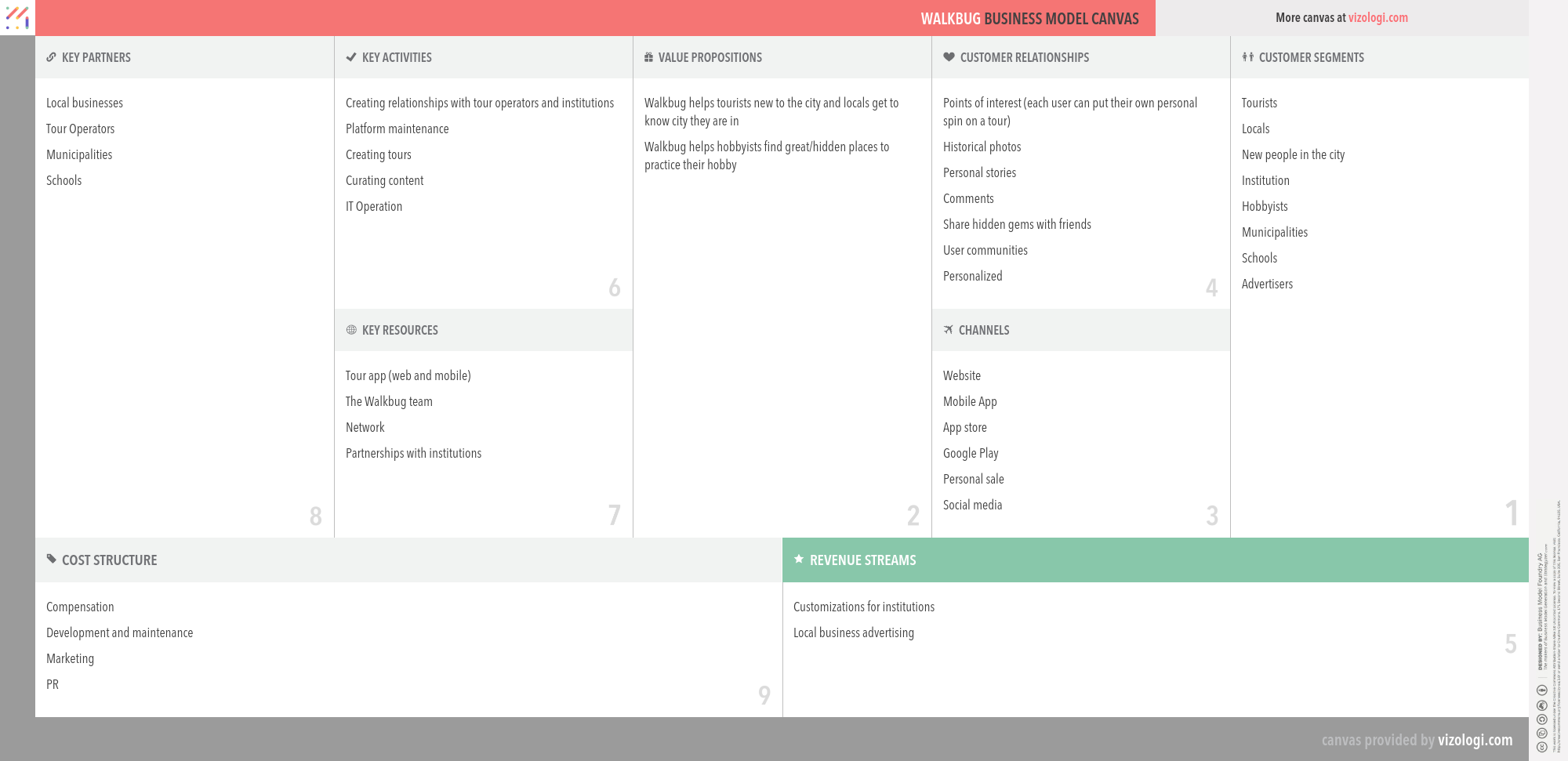Why Walkbug's Business Model is so successful?
Get all the answers 
Walkbug’s Company Overview
Walkbug is a private custom computer programming service in Hamilton, Ontario. Walkbug lets you create and share curated walking tours, allowing travelers to experience any city as the locals do and letting locals unearth hidden gems in their neighborhood.
www.walkbug.comCountry: Ontario
Foundations date: 2013
Type: Private
Sector: Consumer Services
Categories: Travel
Walkbug’s Customer Needs
Social impact:
Life changing: affiliation/belonging
Emotional: reduces anxiety, fun/entertainment, design/aesthetics
Functional: reduces risks, connects, quality, sensory appeal, informs, saves time, avoids hassles, organizes, integrates
Walkbug’s Related Competitors
Walkbug’s Business Operations
Crowdsourcing:
Crowdsourcing is a kind of sourcing in which people or organizations solicit donations from Internet users to acquire required services or ideas. Crowdsourcing differs from outsourcing because work may originate from an undefined public (rather than being commissioned from a particular, identified organization). In addition, those crowdsourcing procedures are a combination of bottom-up and top-down. The benefits of crowdsourcing may include reduced prices, increased speed, better quality, increased flexibility, scalability, and variety. An anonymous crowd adopts a solution to a task or issue, usually through the internet. Contributors are compensated or have the opportunity to win a prize if their answer is selected for manufacturing or sale. Customer engagement and inclusion may help build a good rapport with them, resulting in increased sales and income.
Customer data:
It primarily offers free services to users, stores their personal information, and acts as a platform for users to interact with one another. Additional value is generated by gathering and processing consumer data in advantageous ways for internal use or transfer to interested third parties. Revenue is produced by either directly selling the data to outsiders or by leveraging it for internal reasons, such as increasing the efficacy of advertising. Thus, innovative, sustainable Big Data business models are as prevalent and desired as they are elusive (i.e., data is the new oil).
Exposure:
This model collects data and connects it to others; it is suggested to investigate the impact of advertising on consumer purchase dynamics by explicitly linking the distribution of exposures from a brand's media schedule to the brand purchase incidence behavior patterns over time. The danger is that we may be unable to react productively and cost-effectively to technological and market changes.
Location-based advertising:
Location-based advertising is predicated on the fact that we now take our phones with us everywhere we go. Additionally, most of us are content to share our location data with the different applications we use. This enables marketers to tailor their messaging to individuals depending on their current location. Instantaneously. Advertisers may deliver various messages to other individuals based on the location data obtained from their mobile devices.
Markets are conversations:
For professional services firms, the difference will be made by converting non-engaged customers into engaged customers. Product development will be obsolete. Customer relations and conversations will replace it. By sharing modular and beta products and services with your current and future customers, companies and their customers interact and collaborate in ongoing conversations. Not only will customers find and follow companies in online social networks, but it will also be the other way around as well.
Mobile first behavior:
It is intended to mean that as a company thinks about its website or its other digital means of communications, it should be thinking critically about the mobile experience and how customers and employees will interact with it from their many devices. The term is “mobile first,” and it is intended to mean that as a company thinks about its website or its other digital means of communications, it should be thinking critically about the mobile experience and how customers and employees will interact with it from their many devices.
Reputation builders:
Reputation builders is an innovative software platform that enables companies to create, collect, and manage positive internet reviews. It was a pioneer in the utilization of user-generated material. The website services are provided for free to users, who supply the majority of the content, and the websites of related businesses are monetized via advertising.
Two-sided market:
Two-sided marketplaces, also called two-sided networks, are commercial platforms featuring two different user groups that mutually profit from the web. A multi-sided platform is an organization that generates value mainly via the facilitation of direct contacts between two (or more) distinct kinds of connected consumers (MSP). A two-sided market enables interactions between many interdependent consumer groups. The platform's value grows as more groups or individual members of each group use it. For example, eBay is a marketplace that links buyers and sellers. Google connects advertising and searchers. Social media platforms such as Twitter and Facebook are also bidirectional, linking consumers and marketers.
Recommended companies based on your search:

